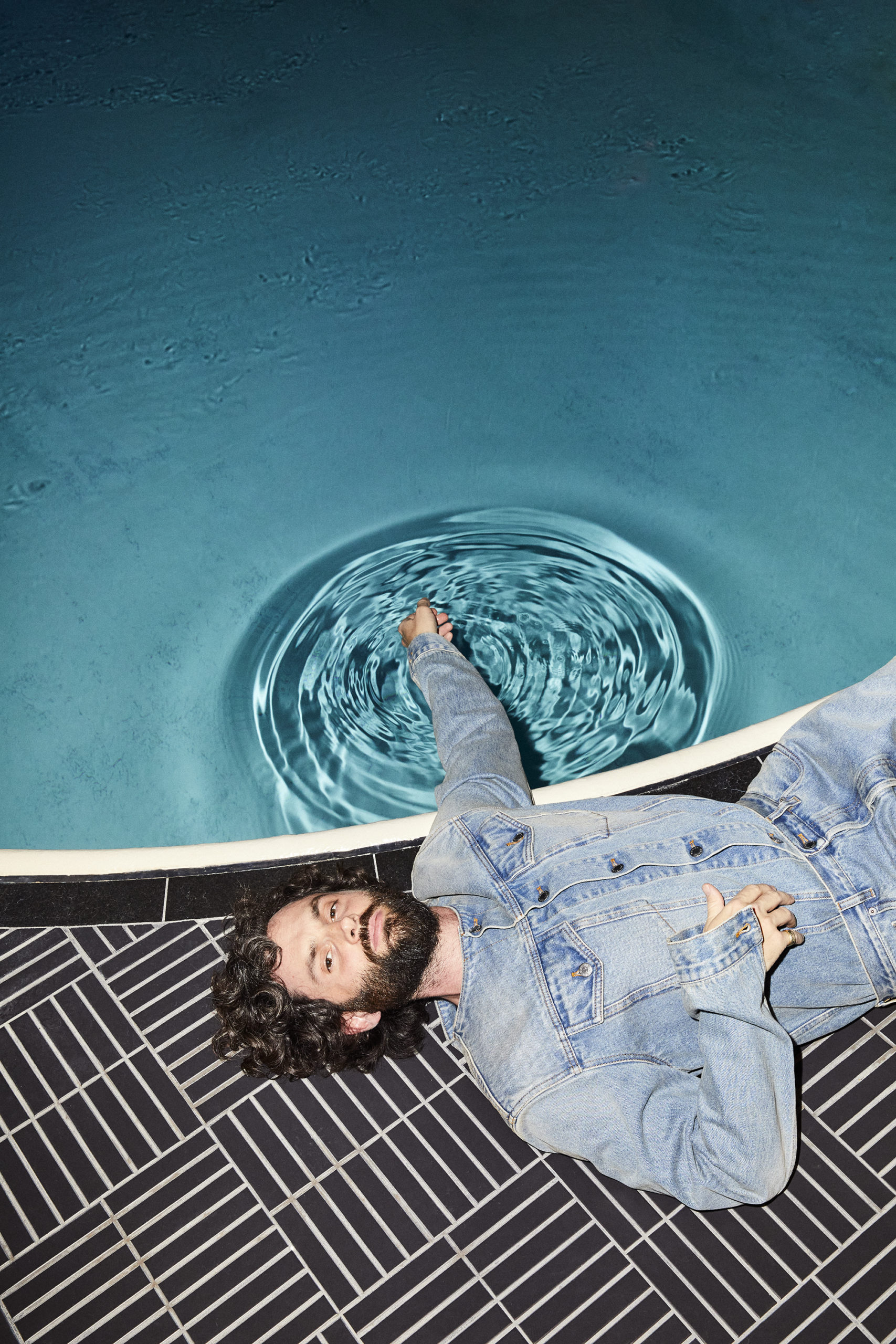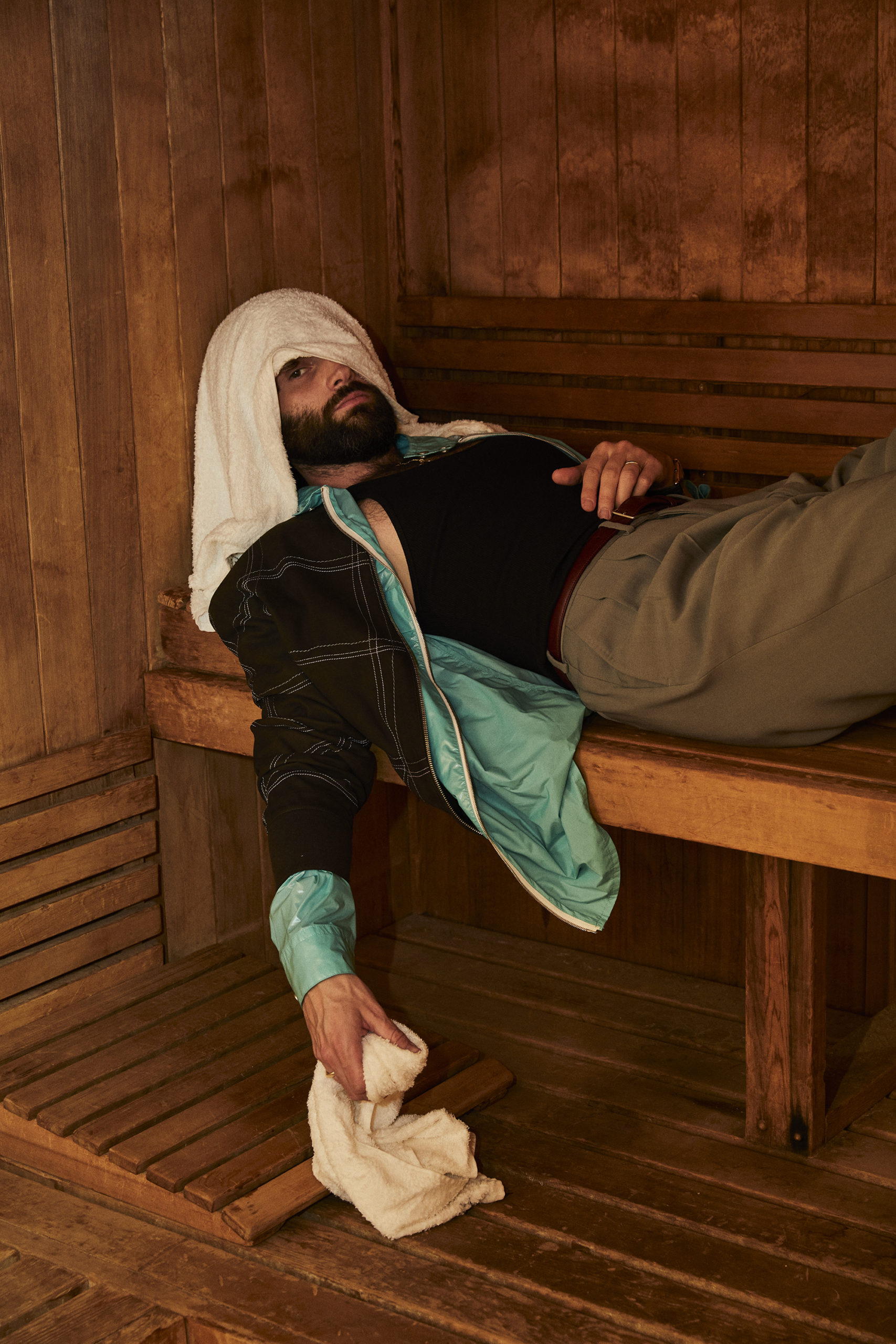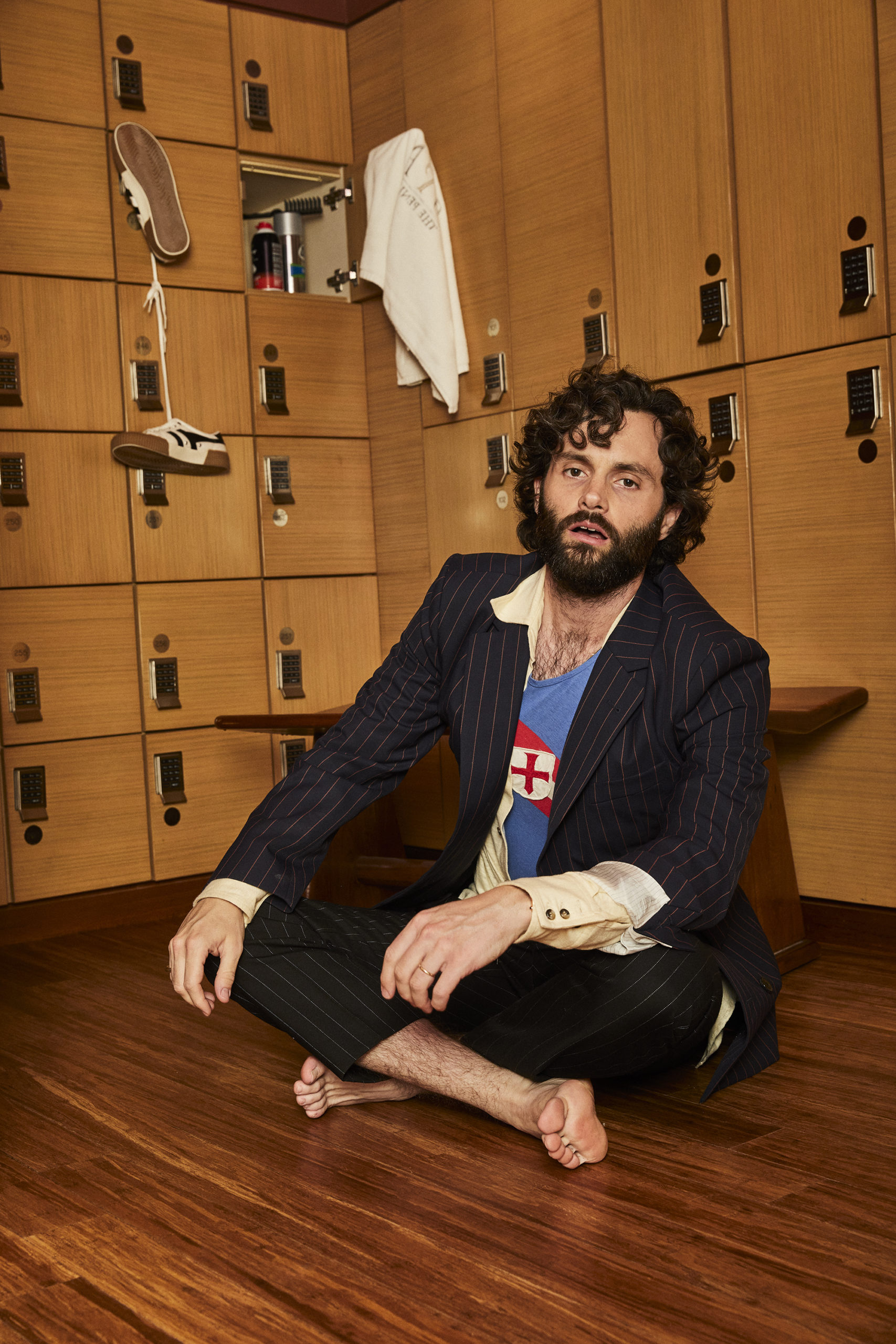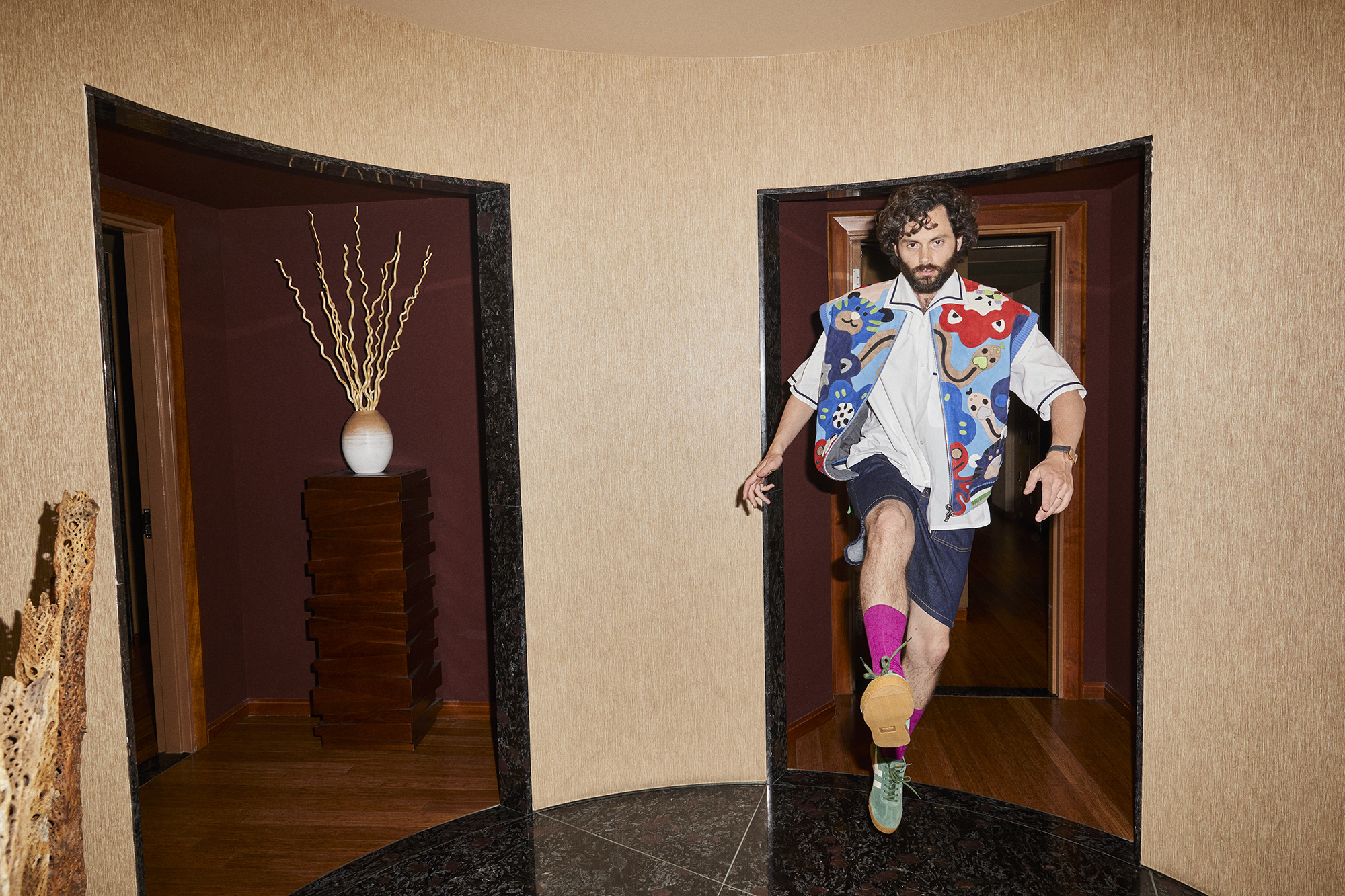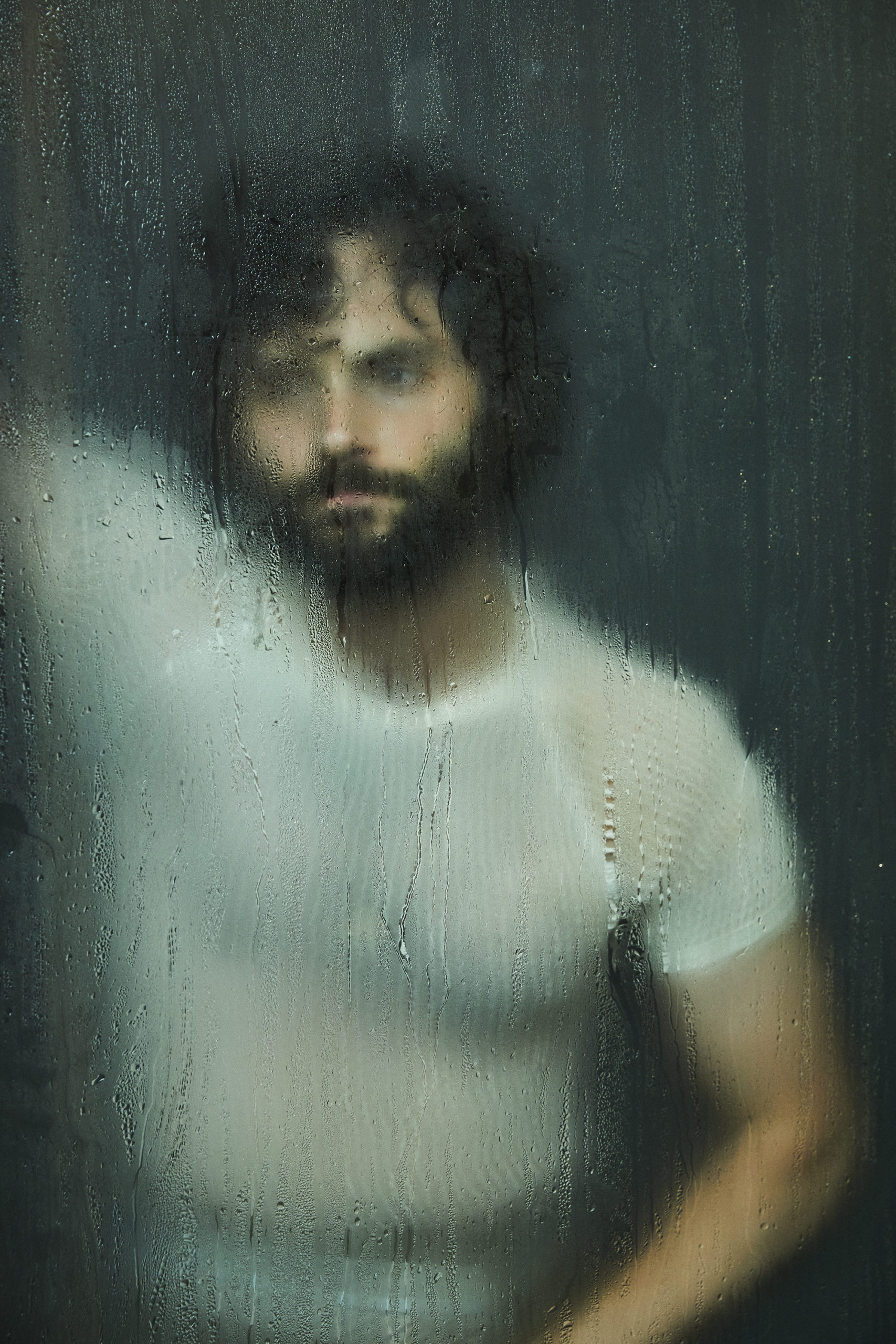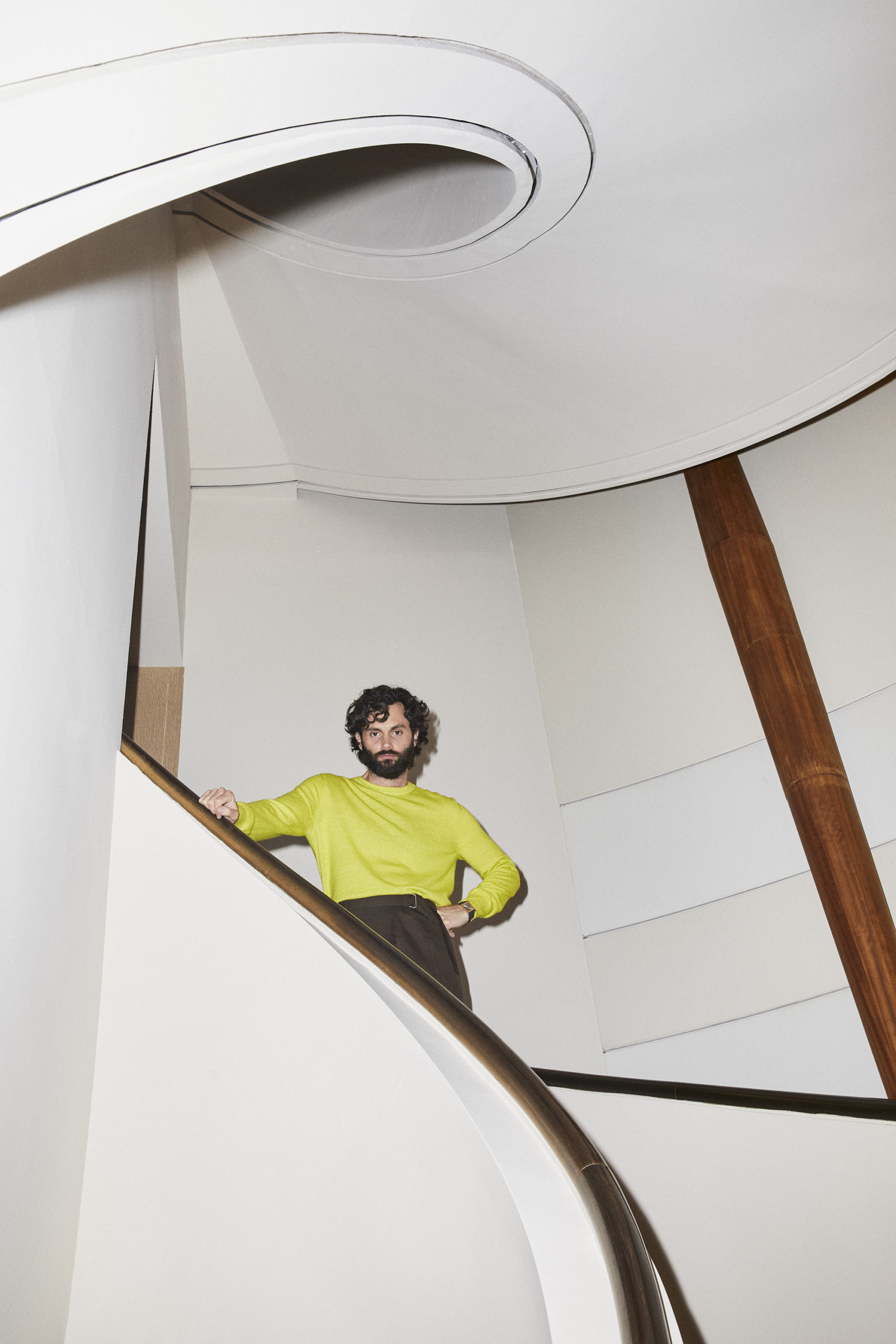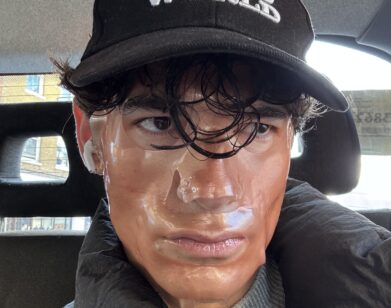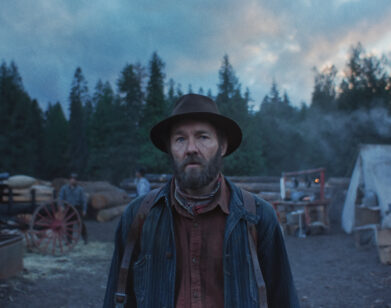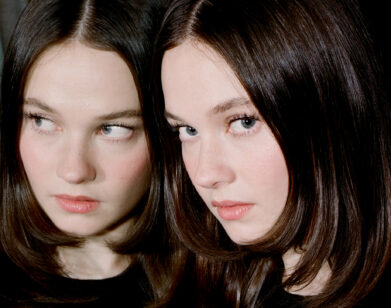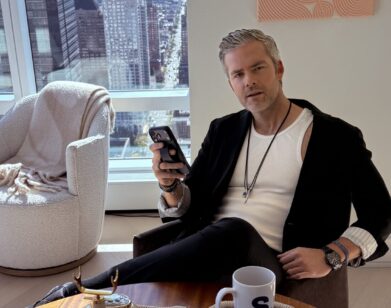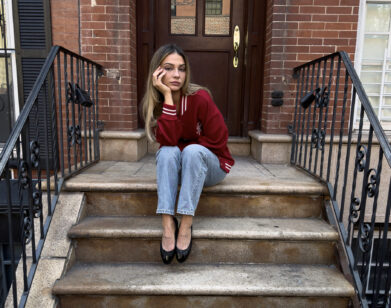killer
Penn Badgley Teaches Ayo Edebiri How to Make a Murderer
WEDNESDAY DEC. 14, 2022 3:30 PM NYC
Penn Badgley, who is promoting the fourth season of his smash-hit Netflix thriller You, logs onto Zoom. Ayo Edebiri, who appeared on Badgley’s podcast Podcrushed to promote her own show The Bear, joins him to return the favor. They spoke for about an hour, deconstructing serial killer myths and ego death.
———
PENN BADGLEY: Where are you?
AYO EDEBIRI: No, I’m supposed to start!
BADGLEY: [Laughs] Okay.
EDEBIRI: Where are you?
BADGLEY: In my bedroom.
EDEBIRI: Are you in New York?
BADGLEY: I am.
EDEBIRI: Are you having a relatively zen time, or are things ramping up?
BADGLEY: No, not in the least. Now, to be clear, I always find “zen time” at some point in any day. But this is one of those moments where the holiday break is a true oasis in the desert of 2022, and I’m just praying that I’m not staring at the mirage.
EDEBIRI: I understand that. I don’t think I’ve experienced more simultaneous highs and lows within one year.
BADGLEY: That’s just the vibe of the times.
EDEBIRI: Yeah.
BADGLEY: You embody… [Laughs] No, that’s not the right thing to say.
EDEBIRI: I embody highs and lows.
BADGLEY: I was going to say 2022, but no. That’s not fair to you either.
EDEBIRI: You’re so good at asking questions that I feel a bit daunted doing this interview.
BADGLEY: That’s funny, because coming into this, I was thinking to myself, “I don’t know what I have to say about anything at this point.” I’m more interested in hearing other people’s stories. That’s why I’m moving into production and direction and then, down the line, writing.
EDEBIRI: So you’re preparing for the launch of the new season of You. Would you describe Joe as a serial killer? Would he describe himself as a serial killer?
BADGLEY: He certainly wouldn’t describe himself as a serial killer. I don’t play him like a serial killer, and I don’t think of him as one.
EDEBIRI: I rewatched some episodes, and I feel like, when one thinks of a serial killer, it’s a person who has this mastery of control, but what’s so funny to me is that Joe is always losing control.
BADGLEY: [Laughs] Completely.
EDEBIRI: Do you find yourself thinking about control when you’re in that headspace?
BADGLEY: Yes, actually. That’s a pretty deep question, because I think about it more as an actor approaching a role than I do specifically approaching Joe. I feel like serial killers aren’t as we imagine them. First of all, there aren’t that many.
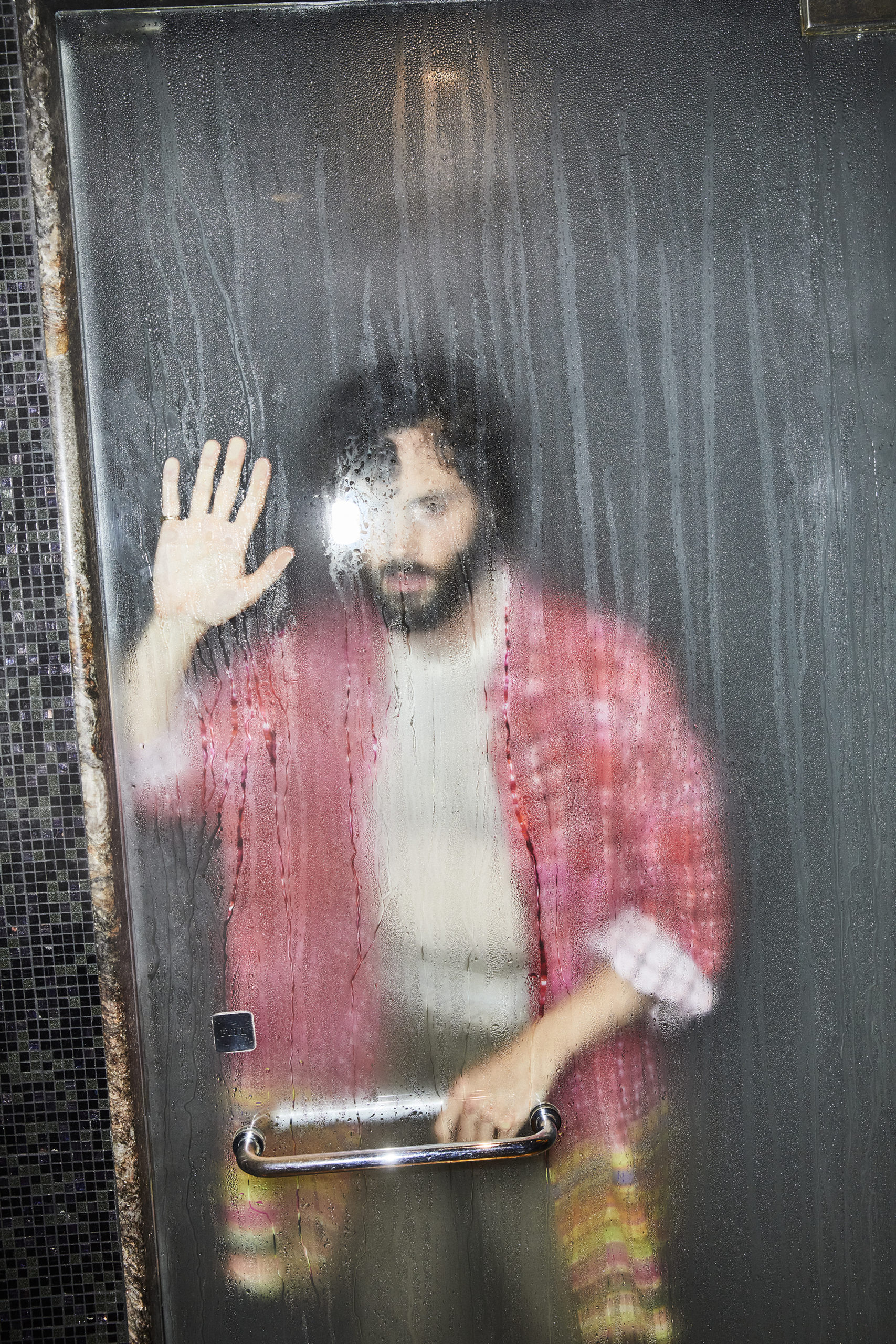
Shirt Dsquared2. T-shirt Stylist’s Own. Necklace and Rings (worn throughout) Penn’s Own. Shorts Dior Men.
EDEBIRI: Right.
BADGLEY: The serial killer mythology, the way the serial killer is imagined as this modern monster or boogeyman, is quite different from reality. We imagine someone who’s capable of doing these things as being very powerful, but the truth is that it’s not power. It gets to some really deep questions about the purpose of life, and the struggle for power everybody feels like they’re facing. To me, he’s definitely a person whose need for control is so high that he’ll put people in a literal box.
EDEBIRI: Yes.
BADGLEY: And I have to ground that in an emotional reality where that’s fully true and not just a metaphor, but I feel like that’s not the show’s job. The show is not bringing to life a clinical portrait of a true serial killer using comedy and social commentary. Sometimes something truly absurd is happening, and I then, as an actor, am thinking about control only in that I need to let go and just serve my role, because if I cling to an idea about how this should be, it’s going to get in the way of—
EDEBIRI: What’s actually happening?
BADGLEY: Yeah. Honestly your question is a profound one. We can’t control our feelings, let alone someone else. The only thing we have any control over is how we choose to respond to our feelings. That’s the extent of human will or freedom. Control is actually one of the biggest things I think about.
EDEBIRI: You said a lot of really great things that jumped out at me, especially the idea of a killer being at this weird intersection of the ultimate monster and some sort of fantasy.
BADGLEY: Totally. This is why I’ve never once thought of him clinically as a serial killer. I’ve never consciously done homework on the psychology of a serial killer, because first of all, there do seem to be a number of profiles. It’s a lot more about toxic misconceptions. I’ll go ahead and try and use a different word, because toxic—
EDEBIRI: It’s a bit of a buzzword.
BADGLEY: It is. And it comes with so much baggage. I’ll say tragic misconceptions, because it’s less judgmental of people. It’s more recognizing that it’s unfortunate, sad, and painful for all of us. There are these ideas we have about love in our modern age of storytelling that don’t represent love the way it exists in real life. For me, this show has been a meditation on love. I’ve almost thought nothing about actual murder, other than between action and cut, when I have to bring that to life. I personally am not remotely fascinated with murder or serial killers. [Laughs] I’m interested in why, collectively, there’s a fascination with them.
EDEBIRI: This show is both a sleeper hit and a hit-hit, which just may be due to the Netflix movement.1 When you’re in a show that people are engaging with at a cultural level, what does that feel like?
BADGLEY: Some people have a career where, for a number of reasons, they approach this craft as an art form. I’ve been working for nearly 25 years and that’s not the way it’s been for me. I’ve been known for essentially two iconic pop roles, one in Gossip Girl, one in this. As a result, I know, with some level of consistency, what it’s like to interact with a hit show at the level of culture. With You, I’ve had an incredibly rewarding experience as an actor, and an incredibly enriching experience as a person witnessing this cultural moment.
EDEBIRI: Right.
BADGLEY: I think of this show as a cultural conversation. It’s not just acting. To me, with something that is interacting with such a seductive, powerful, and in some ways toxic social force, I think there’s some level of responsibility to recognize that, to speak to it, and to interact with it.
EDEBIRI: But it’s that strange thing, where part of the responsibility is recognizing the gravity when it’s there, but also understanding that there is humor at times. There’s a lightness to it, and our job is to entertain.
BADGLEY: Yeah. At the end of the day, it’s an escapist exercise, and it’s funny. I’m interested in it philosophically, but I don’t take it too seriously. I’m always laughing. On set, I’m the least serious person. In fact, it got to a point where not everybody interacts with that in the best way. [Laughs] Charlotte [Ritchie] is my costar for much of the season, and she’s phenomenal. We really got along, but there were points where she was like, “You have to stop.” She said it, of course, with a smile and a laugh, but she was also, I think, quite serious.
EDEBIRI: [Laughs]
BADGLEY: There was one time where I had to stab a dude, and we’re shooting in the middle of the night outside of a parking garage. I’m literally about to stab him with a fake blade, and he’s got all these fake blood pockets on his chest that are going to pop open, and he’s going to have to fake his own death. Right before I was about to brutally stab this man, we were joking around a lot and talking about all kinds of things. I looked down at him and said, “Hey, man. We’re doing god’s work.” And then they’re like, “Action!”
EDEBIRI: I can’t.
BADGLEY: And then I stab him, blood’s gushing, and he’s trying not to laugh. I do this all the time—I laugh, and then I just switch on. To me, you’ve got to do that.
EDEBIRI: Right.
BADGLEY: If this was a movie and you did it once for three months at a time, fine, but I’ve been doing this for six months every year for the last five years. You’ve got to have that levity. On the other hand, this stuff is quite serious. We’re letting the streamers into our most sacred mental space right before we go to sleep.
EDEBIRI: Yes. [Laughs] You said something earlier about the moments between action and cut, and you were talking about that as an actor, but in this season you also directed. What was that like?
BADGLEY: It was both lovely and natural. Then, from a purely logistical standpoint, overwhelming. The production schedule didn’t really allow me the proper amount of time to prep the episode. I had COVID earlier in the production, and the show was filmed in three different time zones.
EDEBIRI: Right.
BADGLEY: It was like sprinting at the end of a marathon, but it was amazing at points to feel how natural it was. In fact, the only thing that allowed me to do it with so little prep was that I’ve been in this central role the whole time. All the crew members were like, “How are you going to do this?” And I was like, “Because the show is so centered around Joe’s perspective, I already know.”
EDEBIRI: You’re already thinking of the big picture.
BADGLEY: Yeah. On the technical side of things, in terms of sound, camera, and script, I’m often in there at a granular level, needing to know certain things that some- times, as an actor, you wouldn’t even want to know. I’ll ask the director, “How are you imagining this edit? Because, first of all, I’ve already recorded the voiceover, but that’s got to fit in between a number of moments.” There’s so many beats happening all at once, because it’s meant to be such a mental experience from this guy’s perspective. Directing was a very natural progression in some ways, but there was no time for me to watch playback, so in a way I was directing intuitively with my eyes closed.
EDEBIRI: Right.
BADGLEY: On the other hand, I found it really nice to direct myself, because it was almost like it became more collaborative with everybody. Not only was I offering feedback to the other actors, I think it became more of a conversation. If we had time, I would just shout out, “Any thoughts?” I’m not controlling or arrogant about it, and I felt, as a director, it was nice to finally take the last bit of ego out as an actor. I think as an actor, you can’t help but cling to your last bit of agency. You’re treated a little bit like a baby. This incredible, million-dollar baby, who’s propped up in front of the camera.
EDEBIRI: You have all the power and also it’s like, “Don’t talk, stay in your trailer for an indefinite amount of time.” You are the Boss Baby.
BADGLEY: Yeah. Let’s come up with a few other references here.
EDEBIRI: Well, I love classic cinema.
BADGLEY: Is Boss Baby classic cinema?
EDEBIRI: Oh, yeah. For me and the readers of Interview, absolutely. By the way, I haven’t seen it. [Laughs] Do you like watching movies or TV in your off time? I mean, you’re also a father of two.
BADGLEY: Do I like it? Yes. Do I do it? No. The first movie I saw in theaters in three years was Nope.
EDEBIRI: Oh my gosh.
BADGLEY: I loved it. Jordan Peele is doing some of what I was trying to speak to earlier. He’s interacting at the level of high art and pop culture. In our industry there’s always contention around the art of it and the business of it. By the way, I don’t care who you are. I think everybody’s very insecure about how commercial or how indie they’re perceived. It’s like high school.
EDEBIRI: Of course. Are there some actors that you’ve been digging lately? I’m rewatching The Mask, for example.
BADGLEY: [Laughs] Oh, wow. That’s a throwback. I used to love that movie.
EDEBIRI: I have very strong feelings that I could share about The Mask that no one needs.
BADGLEY: I’ll tell you this: The Mask and Jim Carrey, together and separately, are some of the most powerful influences I have. I probably make reference to Jim Carrey, on an aggregate, more than anybody else. Whenever I was doing something particularly difficult on set I used to say to Silver Tree, our director for seasons two and three, “Was that good Jim Carrey or bad Jim Carrey?”
EDEBIRI: Love that.
BADGLEY: Because both are valid and brilliant in their own right. It’s all about context.
EDEBIRI: Yes. If you could have a dream day in New York, set in the past, present, or future, what would it be?
BADGLEY: The year is 3726.
EDEBIRI: Let’s go.
BADGLEY: [Laughs] It is no longer the most segregated place in America.
EDEBIRI: I like that joke. You’re allowed to be like, “It’s 2012, and I’m in line to see the Yeah, Yeah, Yeahs.”
BADGLEY: [Laughs] Okay.
EDEBIRI: I’m letting you go there.
BADGLEY: I think that’s the direction I’m going to have to go in, because I’m going through a phase where I’m exhausted by this city. It’s my home. I’ve been here longer than anywhere else, and I’ll always love it, but it’s just a trip. Next summer we’re moving so my oldest can go to high school outside of the city. It’ll be an exercise. I don’t know if we’re meant for rural life.
EDEBIRI: Right.
BADGLEY: But I would say, my early twenties in New York on Gossip Girl were highly memorable. To me, a dream day in New York—it’s almost like Union Square at different hours and in different seasons. That place has been a touchpoint.
EDEBIRI: Oh, wow.
BADGLEY: When I first went there the Virgin megastore was still there and I would actually go and buy records, CDs, and DVDs, and would watch movies because I had time. Let’s see, it would be late September, early October. That is absolutely the best time, because you’re looking forward to Halloween, Thanksgiving, and Christmas, the cinematic magic of New York, but you’re getting the end of summer. You can walk for hours. You can hang out on rooftops. We’re still in the pandemic so my dream day consists of nostalgia. It’s going back in time.
EDEBIRI: Is there anything that you’d love to do as an actor?
BADGLEY: I’m interested in true stories. I would love to engage in the telling of something that intersects with social issues, the story of a journalist, something like that.
EDEBIRI: Your podcast, which I’ve been a guest on—are you having fun?
BADGLEY: Yeah. We just recorded the last episode of the first season. My partners and I, we’re learning a lot, and we want to apply that to the other things we’re developing. I also love having long-form conversations. I actually love journalistic podcasting more than I love celebrity-conversation podcasting. I love Radiolab. In the future, I’d love to be involved in something more like that.
EDEBIRI: Love that for you. I wish I had a banger of a last question.
BADGLEY: I think we end on a spiritual palate cleanser.
EDEBIRI: Hopefully, there are things in this interview that will feel like that. I was reading old Interview pieces, and I was like, “I really want to invoke the spirit of the Judge Judy and RuPaul conversation.” Have you ever read that one?
BADGLEY: No.
EDEBIRI: They talk about the nature of civilization. It’s really powerful.
BADGLEY: That’s amazing.
EDEBIRI: We’re just rolling around on this big ball together, brother. That’s it.
BADGLEY: Yeah. Just rolling around.
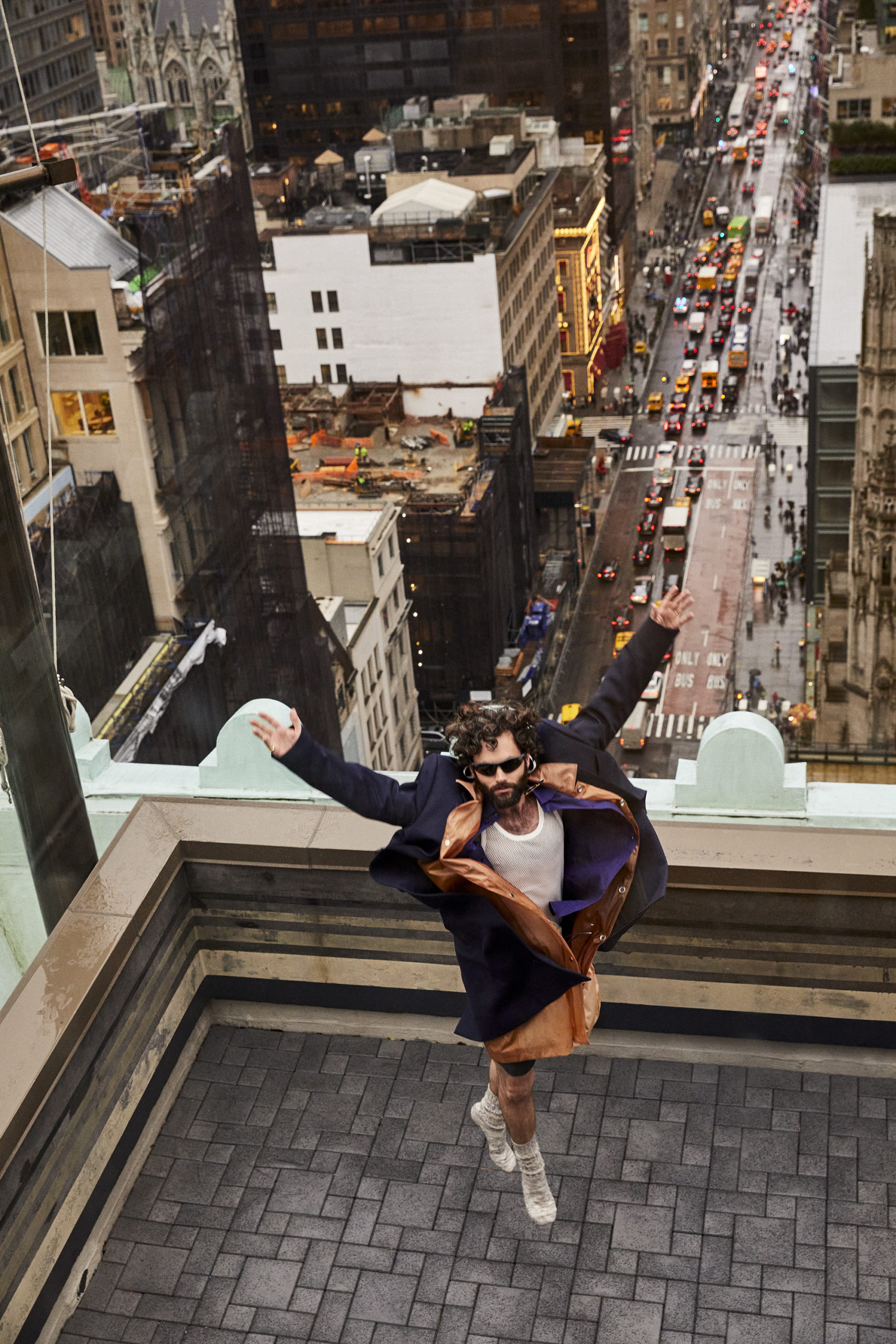
Coat, Vest, and Tank Top AMI. Jacket Zegna. Shirt Berluti. Short Hermes. Socks and Sunglasses Dior Men.
———
Grooming: Kumi Craig Using R+Co At The Wall Group
Photography Assistant: Wes Knoll
Fashion Assistant: Delaney Williams
Location: The Peninsula New York

